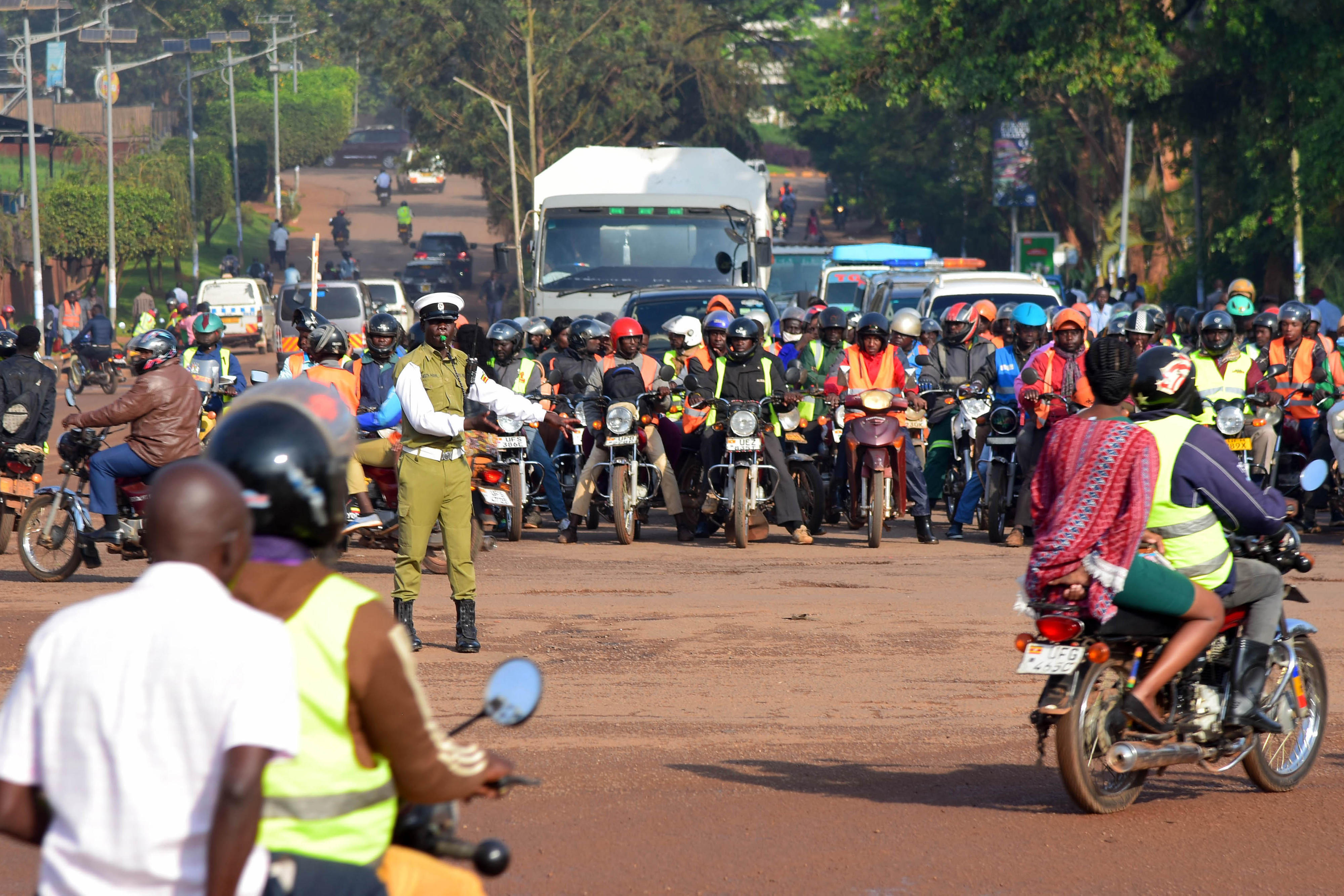Speeding offences to attract a Shs2m fine

A police officer controls traffic flow on Jinja Road in Kampala on December 6, 2022. PHOTO/FRANK BAGUMA
What you need to know:
- Evidence indicates that road carnages are occasioned by recklessness that manifests in poor observance of speed limits.
The new financial year started on July 1 with six Bills that President Museveni assented to this past week expected to play a role in the taxman’s revenue mobilisation drive.
Mr Museveni signed into law the Lotteries and Gaming (Amendment) Bill 2023; Traffic and Road Safety Act, 1998 (Amendment) (No2) Bill 2023; Value Added Tax (Amendment) Bill 2023; and Convention on Mutual Administrative Assistance in Tax Matters Bill, 2023.
The others are the Supplementary Appropriation Bill 2023 as well as Appropriation Bill 2023.
Starting this financial year, any motorist found liable for speeding will be slapped with a Shs2m fine up from Shs200,000 as per the Traffic and Road Safety (Amendment) Act, 2023.
Evidence indicates that road carnages are occasioned by recklessness that manifests in poor observance of speed limits.
“This law should have come yesterday because you cannot replace human life once lost,” Mr Emmanuel Otaala, the Budama West lawmaker, told Monitor, adding the punishments it writes in stone are “deterrent enough to make people begin observing the speed limits.”
Ms Jane Nalunga, the executive director of Southern and Eastern Africa Trade Information and Negotiations Institute or Seatini, says a Shs2m fine “is very unrealistic.”
She adds: “It can be abused because if somebody is confronted with a penalty of Shs2m, somebody would rather [give a] Shs200,000 [bribe] to the police [officer].”
Mr Nathan Itungo, the Kashari South lawmaker, says impunity and corruption would frustrate the law.
Although Mr Otaala strongly supports the punitive aspects of the law, he acknowledges that simply waving a magic wand is not enough to address the issue of road accidents.
He recognises the urgent need for improvement in the country’s road infrastructure.
“In most places you still find that the road signs are not there. The roads are too narrow, so whereas [the] government is on the right path that people must not break the law, the government also needs to do more in terms of working on our roads,” he said, adding, “Our roads are a death trap. At least the roads must be dual carriage. The faster we do these things, the more we are going to save most of the citizens who are perishing.”
Diapers, sports betting
Elsewhere, the Value Added Tax (Amendment) Act, 2023 could see the taxman raise nearly Shs3 billion from diapers annually.
Mr Itungo said the 18 percent levy on diapers will adversely affect the economically-strained mothers as well as elderly persons.
The Lotteries and Gaming (Amendment) Act, 2023 will require one to part with 30 percent off their winnings registered in every stake.
Junior Finance minister Henry Musasizi told Parliament this provision would exempt winnings made at slot machines and in casinos.
“The objective of this amendment is to address the challenge of determining the withholding tax payment at the point for the casinos, slot machines, and lotteries by removing the 15 percent tax and increasing the tax paid on casinos, slot machines and lotteries game from 20 percent to 30 percent. The objective of this reform is to ease administration,” Mr Musasizi told lawmakers during the Bill processing stage.
Ms Nalunga, however, thinks this tax levy should have been higher since the legislation is meant to, among other things, “regulate public behaviour [since] sports betting has so many challenges for our young people and to the public.”
She added: “A deterrent figure should be a little bit higher, possibly going up to 70 percent or 80 percent.”
Rejected taxes
President Museveni declined to sign the Tax Procedure Code (Amendment) Bill, 2023 and the Income Tax (Amendment) Bill, 2023 into law.
The latter Bill seeks to, among others, impose a five percent tax on digital companies such as Facebook, Google, and Amazon.
While its goal is to boost local revenue, shadow Finance minister Muwanga Kivumbi argued on the floor of Parliament that increments would reflect on the payslips of Ugandans.
However, President Museveni in his letter to Speaker Anita Among, said: “Clause 16 of the Bill, which proposed the introduction of a tax on income derived from a non-resident person from provision of digital services in Uganda, was rejected by Parliament. The measure was meant to cater for taxation of the digital economy such as Twitter, Amazon, Netflix etc.
“Since it does not relate [to] residents in Uganda as was mistakenly [stated] in the minority report, it should be reinstated.”
Considering that the tax Bills are a key component in the implementation of the tax measures and defining direction of revenue resources in the country, Speaker Among has already directed the House Committee on Finance to revisit and expeditiously process the Bills Mr Museveni returned.
“I need this reconsidered and it should be done faster,” she told the Finance Committee chairperson, Mr Amos Kakunda.
To this effect, the committee is slated to interface with the Finance ministry, the taxman, and other line stakeholders before a report on the same is presented to the House.




